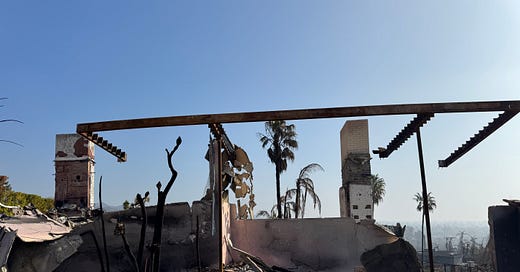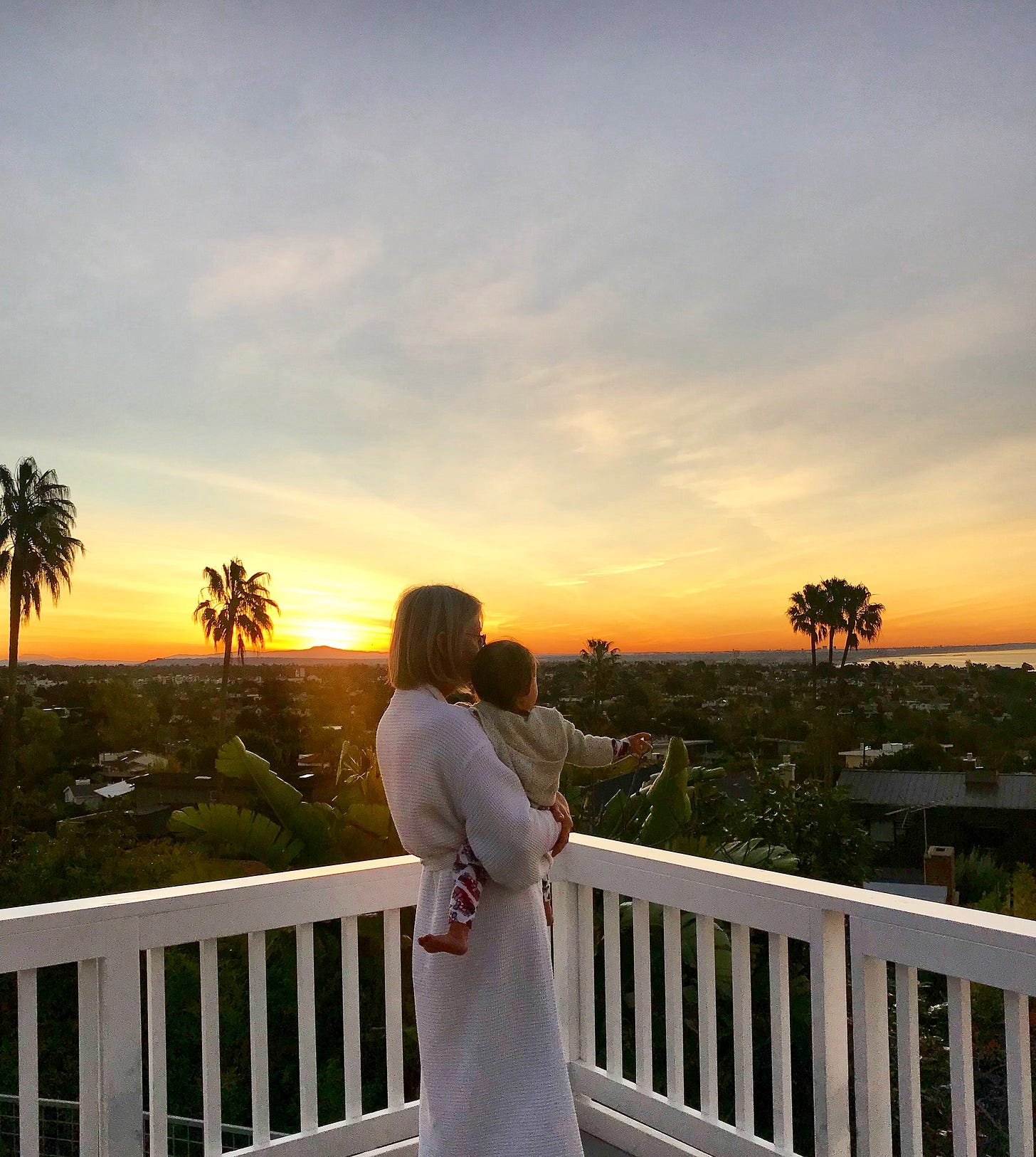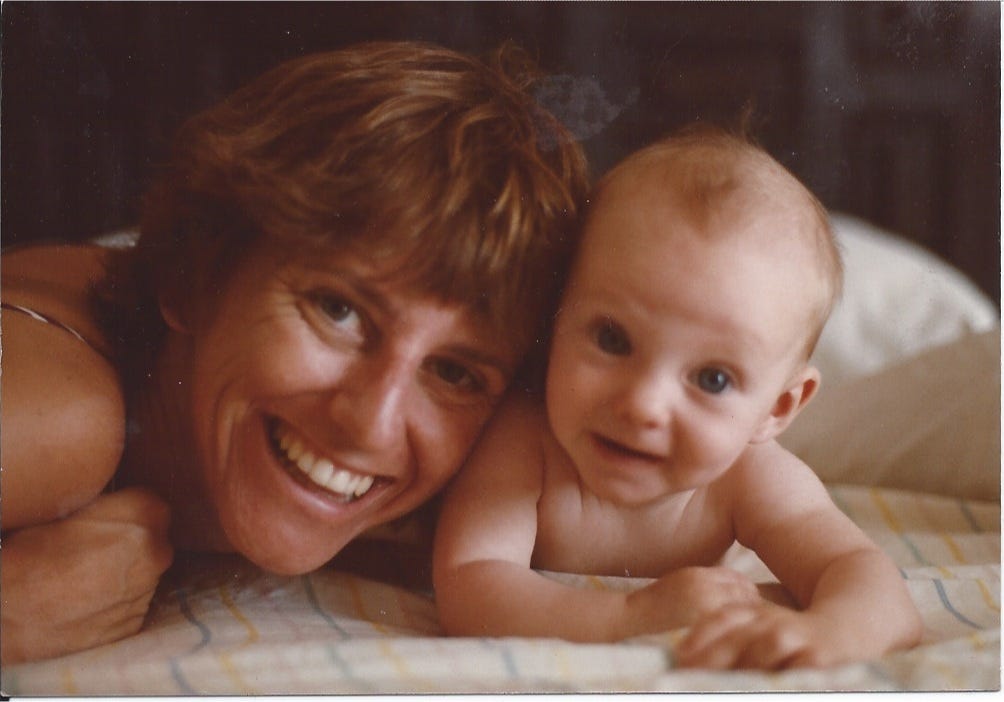Revisiting home by Danielle Levanas
Two homes destroyed: the death of my mother five years ago, and the loss of my family house in the Palisades Fire five weeks ago.
Beautiful words by our friend and therapist Danielle Levanas for MOM WORLD
I lie here holding my almost 2-year-old daughter who is sick with the flu. It’s 3:14am. Her feverish cheek rests against mine for comfort. Her little body coughs every so often, into my eyes, my nose, my mouth. I am reminded of how I am my daughter’s home, just as my mother was mine.
Two collapses in my world right now: the death of my mother five years ago, and the loss of my family house in the Palisades Fire five weeks ago. Two of my homes destroyed.
We went back to the house in the Palisades last weekend. Or what was left. Mostly a chimney and a lot of rubble. My dad, my sister, and I adorned ourselves in the requisite garb of hazmat suits, particle filtering face masks, and goggles. Driving up to the house I had imagined moving a pile of sheet rock and finding a partially preserved photo album or the melted plastic pill box containing my mom's diamond earrings. In the movie of this moment we’d have a miracle. But there are no miracles like that in this story. Like my mother who went before us, the house had been transformed into ash.
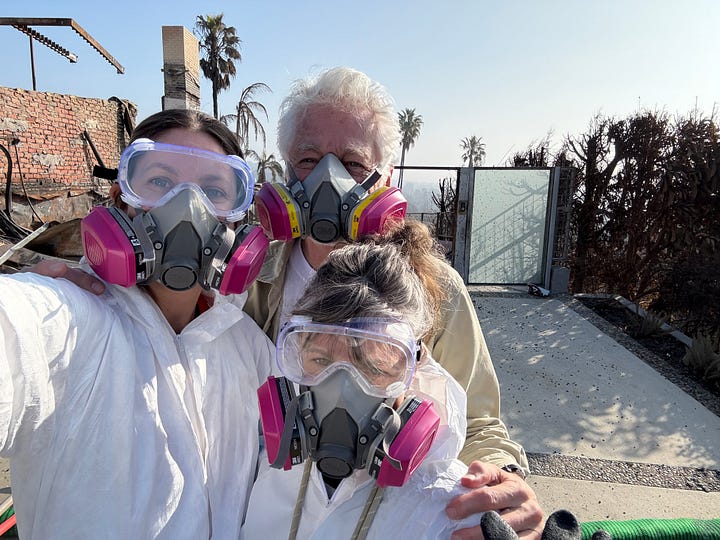
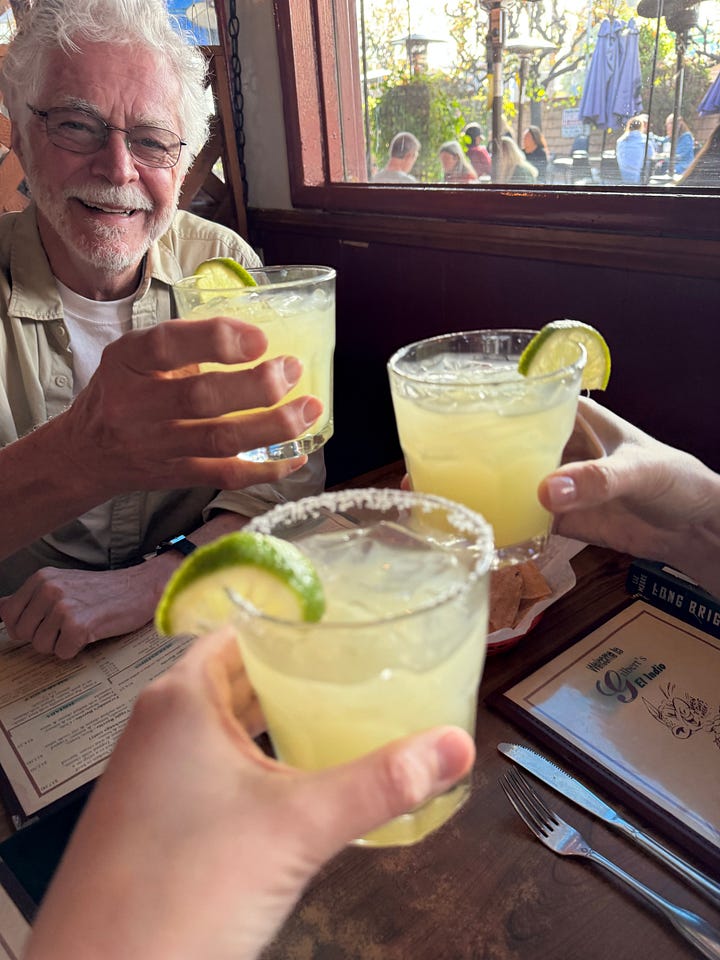
Instead the miracles came after we strip off the hazmat suits in the form of my dad starting a water fight in the street out front of where the house used to be, in the margaritas we shared at Gilbert's El Indio later that day, in the flood of previously forgotten memories that came to us while exploring the destroyed structure. We laughed finding my dad’s burnt up hairspray can, finding mail untouched in the mailbox (from Citibank of all places). Because we were still at the source. Crooked, twisted, and transformed but still there.
I was reminded of the days after mom’s surgery, sitting by her hospital bed. My mom went in for routine heart surgery in January 2020 and never woke up. She was in a coma for 8 days before we took her off life support, and those 8 days at the hospital live in my mind as a time-out-of-time with the most exquisite contradiction of joy and pain. It was two months before the pandemic, and we had a steady flow of friends and loved ones visiting at all hours. My mom’s girlfriends slept over with her, gabbing, giggling, and crying with each other like preteens at a slumber party. My sister and I spent quiet moments reading Rupi Kaur poetry aloud or chatting together. People brought balloons and flowers, and we played Juan Luis Guerra on a bluetooth speaker and decorated the walls with cards and drawings made by my then 2.5-year-old son. It was glorious in a crystalline type of way. So brilliant. So much light. So precious and delicate and rare. All the people. All the love. Complete connection.
Going through the rubble of our house felt like the experience of touching my mom’s body on life support. While the interior of her mind, like that of the house, was different, the shape could still be recognized. We could gather near this familiar outline, see the bones, and attach to it all the connection and comfort we had felt before disaster hit.
Loss for me feels manageable in close proximity to it. When we are still in reaching distance of the tangible memories. After 8 days, we made the decision to take my mom off life support. This was something she had expressed clearly to us in the past, that she didn’t want to be kept alive if she couldn’t live. No stranger to health challenges, she was first diagnosed with cancer at age 17 and had been in remission from Hodgkin's Lymphoma for almost 30 years. She worked at UCLA as an LCSW with people undergoing treatment for breast and ovarian cancer. My mom lived with the awareness of death, and it brought her a unique ability to live with an immense amount of genuine joy.
Something I’m rapidly realizing, the loss of our house hurts so much because a lot of my childhood was just so good. When I came home from college for the first time, I noticed (in that way you don’t notice until you leave home) how my mom woke up every morning with gratitude for the sunrise. She would put on her robe, make her coffee, and look out at the palm trees, sky, and ocean. She didn’t have a lot of stuff, she didn’t own stylish clothes or jewelry, she didn’t have a very discerning taste in art or culture, and she didn’t dye her hair or have any beauty regimens besides soap and lotion. There was a simplicity to her choices as she aged. In the five years leading up to her death, she actually started getting rid of a lot of things. The few things she did keep were deeply meaningful (and heartbreakingly, most were lost in the fire). She lived an intentional life in a beautiful place. She had the privilege of space, luck, security, and safety that is afforded so few, but she also lived with the awareness that none of us know if we have the privilege of time.

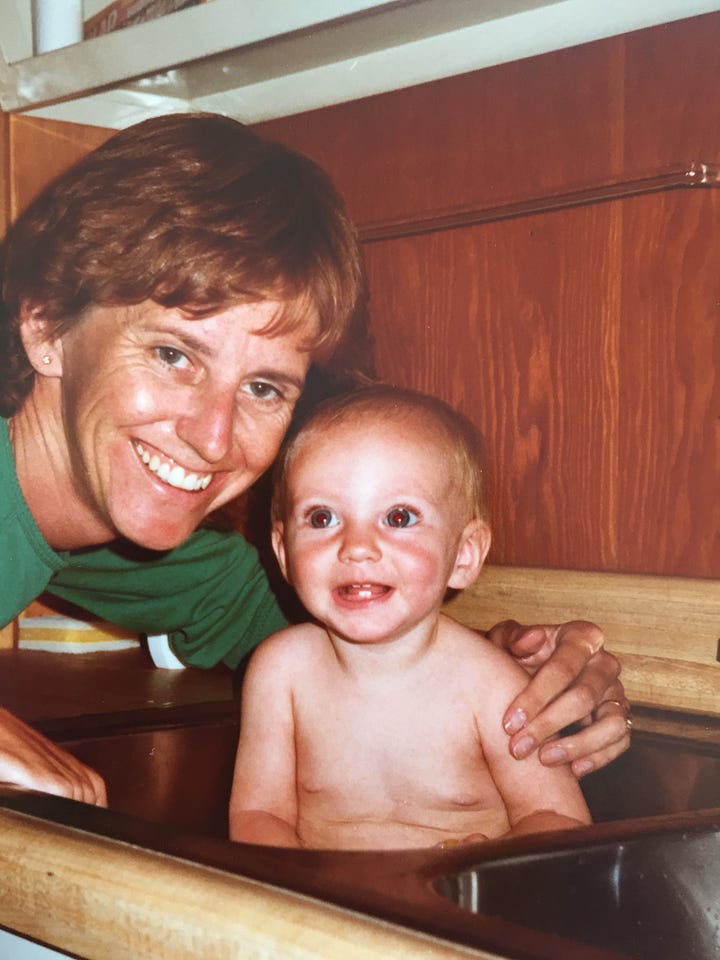
Don’t get me wrong, my mom and I argued. We were similar in all the worst of ways: controlling, fiercely protective of our independence, a little cruel in our bluntness. However, my dad would say that we are similar in many kind ways too. Revisiting the rubble of the house reminded me how much of my internal self concept was informed by my mom’s daily habits. When you have been modeled the experience of gratitude on a regular basis, that inner experience does not go away once the outside changes. The memories, while the details might get forgotten, live on in the DNA of a family and get passed onto the next generation. They live on in the bones and in the very foundation of who we are. My parents lived with a kind of sweetness for their everyday existence that created the fibers of my childhood. That was what we were celebrating when visiting the site of our destroyed house.
When we left my mom’s hospital room for the last time, I wrote, “Hug your loved ones tonight. Everything is going to be ok.” That is also how I felt leaving the Palisades last week. Suspended in limbo at the burn site - still smelling the antiseptic air of the ICU - I could experience the energetic link to both my homes: my mother and the house. Holding us, centering us. They changed forms but I was still plugged in. I imagined that the vital force of togetherness and simplicity would guide us forever.
But then life kicks into gear. In 2020, the pandemic started. In 2025, my now 7-year-old brought home the flu from school, and we all got taken out. I got the results from an MRI on my lower back, not good. And I’m not ok again. Because after the funeral, after the news crews and the Red Cross leave, and after the wishes of love, shock, and support die down, we are left with the emptiness. The disconnection. This is the most painful part. Mom’s ashes and the rubble of the house, they are not as easy to hold on to. Where once my connections were vibrant, now they move to the background of my life, existing as wisps of feelings that I work around in the effort to keep up with the people who need more from me now.
Suleika Jaouad writes, “Grief is a ghost that visits without warning. It comes in the night and rips you from your sleep… It haunts you until it becomes a part of you, shadowing you breath for breath.” But the grief also connects us to something that starts to slip away as time moves forward. More than anything, I wish I could hold mom’s hand just a little longer. The space her body once filled in the world still aches with a sharp emptiness, a pain I feel even now, five years later, as raw as the breaking of my own bone.
It’s colder from this vantage point today. The rains have come (thank God), and they wash it all away. For a new story. For someone else’s loved one in that hospital room. For a different structure, shape, and architecture where our house once stood. I go to a yin yoga class, and I’m so distracted I just lie there paralyzed even though every part of me wants to cry. Guiding myself to breathe slowly and methodically. Work continues. I make coffee in the morning. My husband takes the trash bins out to the curb. I fall asleep on the floor of the kids’ room. My life moves on and the evolution continues. In some ways, I lose that visceral connection to the body I was grown in, and the walls that contained my home. In other ways I memorialize them more clearly as I write these words.
My daughter mumbles a phrase in her sleep that I think are toddler lyrics to “Let It Go” from Frozen. I probably won’t fall back asleep tonight. I’m haunted, and I welcome the ghosts with an open heart. Breath for breath.•

